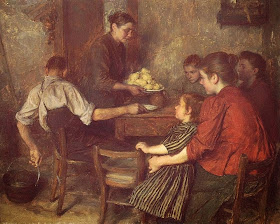If you live in a country which, once, had the habit of
celebrating this time of the season as a holiday, you may recall the traditions
that once prompted the urge to shop for a dressy pastel outfit, or gather as
extended family for a commemorative meal. As I did my shopping yesterday—first at
the local mall, then stopping at the grocery store on my way home from town—I wasn’t
so sure anyone remembers, now.
It was distressing, seeing the racks filled with so many new
clothes—packed so tightly as to make it impossible to pull out a hanger to even
take a look at what was being offered for sale. Though the mall’s parking lot
was nearly as full as it usually is, right before Christmas, it seemed all the
people in town wouldn’t be enough to buy all that was offered for sale there.
We are so overburdened with stuff.
And yet, that is all this holiday weekend has been reduced to: an essence of things.
More things. The merchandisers have stolen the meaning of our holidays—our
holy-days—and we’ve let them.
Not that I begrudge anyone their recovery from recent
economic downturns—I’m glad those times are past us. Shop away, my friend, if
that is what you intend to do. More power to those who have the means to do so.
But don’t let it be all that your life is reduced to. All of us have tokens of a
heritage much richer than such trinkets.
That episode from the day’s errands became the evening’s
dinner conversation. During the course of the discussion, I realized that not
many people can even relate, now, to such historic upsets as the Great
Depression. A good percentage of our current population doesn’t even have
recollections of being raised by someone who was a child of the Depression. No stash of saved bread bags—there, mind
you, not because Mama was a firm believer in recycling. She wasn’t doing this
to Save the Earth; she was doing it to save pennies.
A prompt from Twitter, featuring a recap of recent interesting
Tweets, showed up in my inbox as encore to the day’s observations. One, from
Findmypast UK’s
“Dapper Historian” Myko Clelland, displayed photos of four elderly women and commented,
These are the last four people on earth born in the 1800s. The stories they must be able to tell!
Considering the implication that these subjects must each be well
over one hundred years of age, the virtue of their continued existence would be
that we could, in theory, pepper them with whatever questions our curiosity now
instigates—though the challenge would be to see whether they could actually remember what answers to provide.
Despite that continual litany heard by fellow genealogists
the world over—“If only I had thought to ask them when they were alive”—we do
have recourse in this dilemma. It’s known as print media: those books,
newspapers, journals, letters and other documents preserving the words of prior
generations via ink on paper.
The only problem is: they are silent testaments. They need someone to serve as catalyst to get
their message out. To lift the stories off the pages of the past and put them back in
circulation.
That is where we come in: we are the story-tellers. We are
the ones who connect the memories of the past with a new generation of rememberers. We are the connectors linking our
collective past with the agents of the future.
Whether you are a blogger, actively telling your story to
everyone who chances upon your digital domain, or a researcher with the best of
intents to “someday” pass that story along, I hope you realize the crucial role
you play in keeping your family’s—and your culture’s—story alive.
Stories only live as long as they are still told. Their meaning retains its
viability only as long as they are being shared. What is important to you will
be important to no one else, once you are gone, unless
you see yourself as the vital link you are—and put that belief into action.
Otherwise, your valued family traditions and history will devolve, first, into
hollow tokens and eventually, into meaningless trinkets of a bygone era few can
even understand.
Above: "The Frugal Repast," painting by French artist Émile Friant; courtesy Wikipedia; in the public domain.
Above: "The Frugal Repast," painting by French artist Émile Friant; courtesy Wikipedia; in the public domain.

Thank you for the validation of our craft.
ReplyDeleteYou are certainly welcome, Gayle! What we are doing with our blogs and other writing and researching projects is so vital to the passing down of our heritage. Please, always be encouraged that what you are doing will make a difference.
DeleteInspiring!
ReplyDeleteThank you, Margie. And thank you for your kind mention of this post in your own blog!
DeleteHappy Easter! No new bonnet or dress here, I am way past that! Making memories...we made some today for that I am grateful.
ReplyDeleteYes I am a story teller, some old some new...life goes on and hopefully someday it will be appreciated:)
I know I appreciate all those hundred year old books I am finding on my family's history. Just think...if those people hadn't taken the time and effort to write down what they knew or discovered...those details would be lost to Time. If you have the gift to tell the story, you are the one best equipped to pass those stories down. And yes, though it may not happen until after you are gone, it will be appreciated.
DeleteI remember my grandparents doing some "odd things" and saying it was because of the Depression ... hoarding anything - even rusty nails... I just hope I never see such times.
ReplyDeleteI've read some sobering descriptions of those times--then, again, I've also read some inspiring reports of how people endured and helped each other. Some people will always find a way to make it through.
DeleteBut, yes: I'd hope to never have that experience, either.